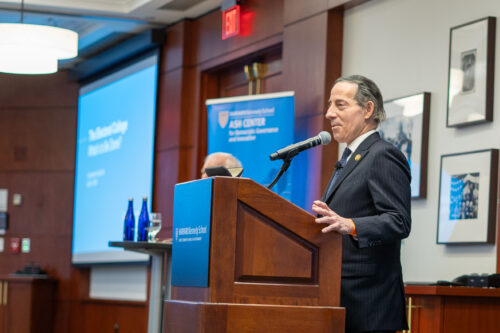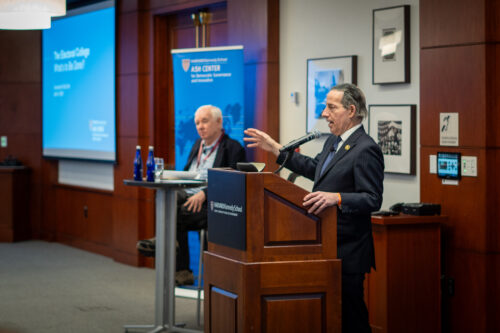
Video
Feature
At an Ash Center symposium on Electoral College reform, Congressman Jamie Raskin makes the case that the US should finally move to a direct popular vote for selecting presidential winners.
With the fall campaign season just months away, Joe Biden and Donald Trump are mapping out their general election strategies – most of which target the handful of competitive swing states needed to vault either candidate over the critical 270 Electoral College vote threshold. While tens of millions of Americans will head to the polls in November, only a handful of swing states, split by a few thousand voters, are again likely to determine the results of what may be the most consequential presidential election in memory.
For voters living outside of those swing states, their vote, and their voice are ultimately of little consequence in determining the next president of the United States. “The vast majority of Americans live in safe blue states or safe red states,” said Congressman Jamie Raskin (D-MD), a constitutional scholar who has used his perch as a member of the House Judiciary Committee to advocate ditching the Electoral College system for choosing presidents. “It marginalizes the vast majority of Americans, including primarily everybody in this room.”
Raskin, speaking at a conference sponsored by the Ash Center examining the future of the Electoral College, was deeply critical of the current system for formally selecting presidential winners. “It’s an accident waiting to happen every four years. I mean, Jefferson himself called it an ink blot on the Constitution. And so, it’s always been recognized that it’s dangerous and dangerously unstable.”
Video
Having also served on the House Select Committee on January 6th, which investigated the attack on the Capitol that intended to prevent the formal certification of President Biden’s victory, Raskin was involved in drafting legislation to clarify several technical aspects of the vote counting and certification process. He called the resulting Electoral Count Act a “modest improved safeguard,” but he still sees the need for more transformative steps to reform the Electoral College itself. “The reality is that even if those rules had been in place in 2020, they would’ve had the numbers to register the same objections. And so, nothing in these tiny reforms in the Electoral Count Act remotely address any of the problems in the Electoral College.”
For historian Alex Keyssar, Matthew W. Stirling Jr. Professor of History and Social Policy at HKS and author of Why Do We Still Have the Electoral College, the failings of the Electoral College have “been visible for a very long time and have been the object of protest for a very long time.” With two presidents having taken office in the 21st century by winning the Electoral College and losing the popular vote, Keyssar fears that a prolonged pessimism about the possibilities of Electoral College reform has taken root.
The idea behind the Ash Center conference, explained Keyssar, was to convene a group of scholars and practitioners passionate about democracy reform and help plant the issue of the Electoral College squarely at the forefront of their agendas. “We’ve invited a lot of people who have been very engaged in democratic reform, but not necessarily around Electoral College reform – and to try to engage in conversations with them.” Keyssar holds out hope that the ideas broached by Raskin and other Electoral College reformers will help jumpstart a more serious conversation about strategies for adopting a new method for formally selecting presidents.
“How about we start electing the President of the United States the way we elect governors and senators and representatives and mayors and everybody else, whoever gets the most votes wins,” Raskin added. “It’s not that complicated an idea.”
Keyssar was quick to concur: “We should have a presidential election like we elect members as presidents of the student council — you vote and the person who wins the most votes wins. Very simple.”
Podcast
In the season 2 premiere of Terms of Engagement, Archon Fung and Stephen Richer revisit January 6 with journalist Mary Clare Jalonick to examine what the January 6 Capitol attack reveals about democratic trust, accountability, and political violence.
Podcast
In the season finale, author and political theorist Laura Field joins co-hosts Archon Fung and Stephen Richer to unpack the ideas and beliefs of the New Right and their impact on elections, race, and public debate.
Podcast
Co-hosts Archon Fung and Stephen Richer unpack the latest developments in the Epstein saga and explore what they reveal about shifting political alignments, growing demands for accountability, and the relationship between power and public trust.
Podcast
In the season 2 premiere of Terms of Engagement, Archon Fung and Stephen Richer revisit January 6 with journalist Mary Clare Jalonick to examine what the January 6 Capitol attack reveals about democratic trust, accountability, and political violence.
Podcast
In the season finale, author and political theorist Laura Field joins co-hosts Archon Fung and Stephen Richer to unpack the ideas and beliefs of the New Right and their impact on elections, race, and public debate.
Podcast
Co-hosts Archon Fung and Stephen Richer unpack the latest developments in the Epstein saga and explore what they reveal about shifting political alignments, growing demands for accountability, and the relationship between power and public trust.

